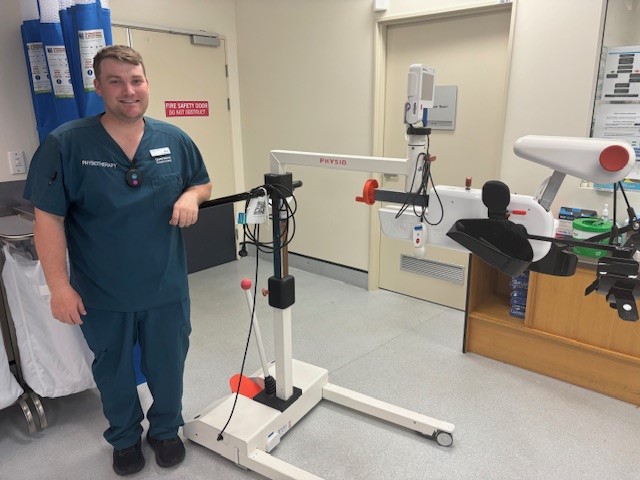
A unique piece of equipment made possible by the PA Foundation is having a huge impact on the rehabilitation of critically ill patients at the PA Hospital.
The PA has multiple Motomed In-Bed Cycles, but this particular one, was acquired by PA’s charitable arm through a grant from the Coca Cola Australia Foundation, to specifically help patients in the intensive care and orthopedic wards. This was primarily because the machines were in such demand, the Foundation wanted to ensure if a physiotherapist wanted one to use with an ICU patient, that they could.
Physiotherapist Alun Jones said the Motomed is used regularly with patients to get them moving as quickly as is possible to aid in their recovery as movement is linked to improved health outcomes.
“The benefit of the Motomed is that we care for critically unwell patients who are very weak or they can’t attend gym-based rehab sessions. It is here that the Motomed has the most impact and it's being used primarily with the critically weak patients,” he said.
“It gives us a great a way of increasing the amount of therapy that those patients can do in a day. Our physiotherapy assistants are also trained with how to use it, which means that we can deploy it with a lot more patients every day.”
“We're using it within that critically weak population, but also on other wards as well as it's an easy alternative exercise to add in and start expanding the sessions that we're doing with patients.
“Therapy like this wasn't being delivered in the past, and the Motomed gives us an easier alternative to increasing the amount of therapy people can do in one day. Normally we would need an assistant and a Physiotherapist to assist people with mobilising however you can setup this bike by yourself. This means we can focus on mobility for one session then add to it with the Motomed later in the day.”
Alun said once introduced to the machine it quickly becomes an exercise of choice for many patients.
“Once you use it with them the first time, they're very keen. I Have never had anyone say they never want to do it again. In fact, they're normally asking, “can we cycle today?”,” he said.
“It's a way of engaging them in a different way. It has an interactive display on it, which is useful for them as well. It shows them the difference in power output between sides and it can also help because you can go in both directions.
“It's gives us a more engaging way for the patients to try and do more therapy sessions. A lot of the research shows that increased therapy can progress patients in terms of quality of life and function. This is something that you can deliver easily through an intervention like this. Particularly when they can't necessarily just get up and walk around themselves.
“We’re really grateful for it.”




